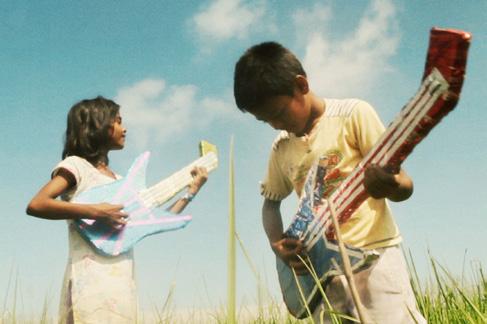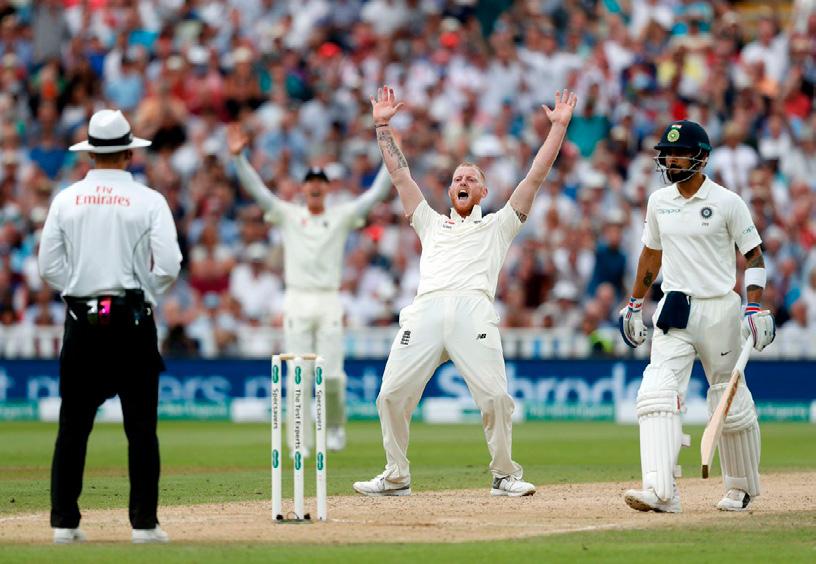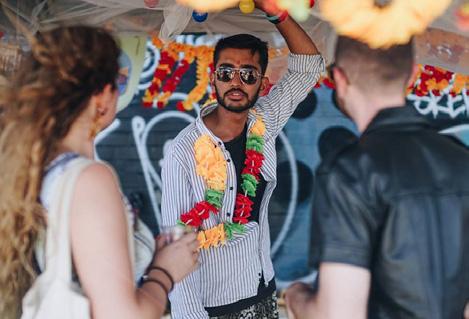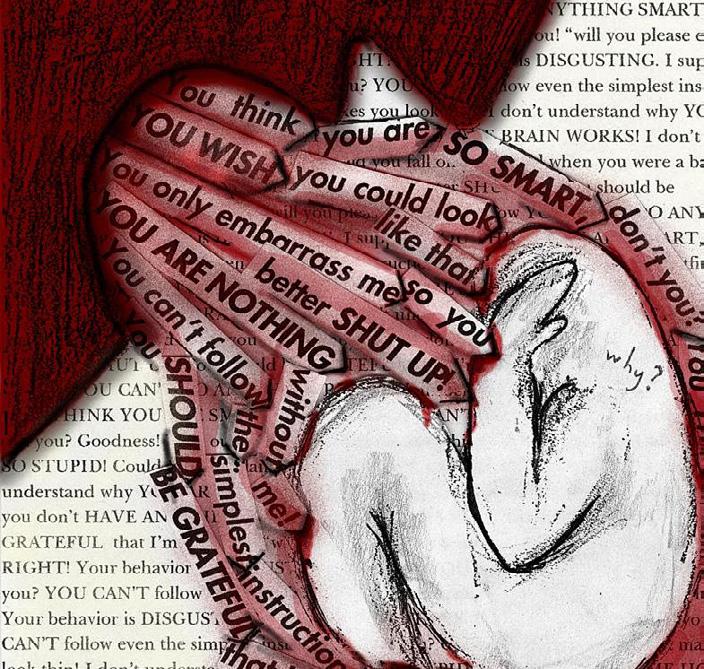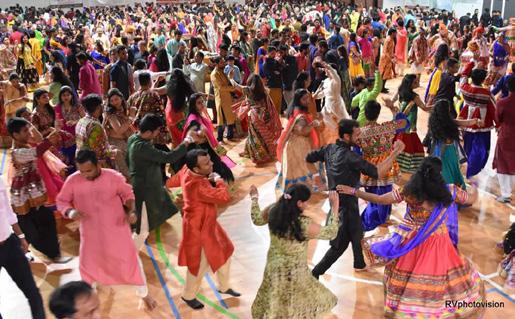
14 minute read
Eye on Wentworth
from 2018-10 Adelaide
by Indian Link
In
BY PAWAN LUTHRA
The stakes are high. A loss in the current by-election in the seat of Wentworth on 20 October can leave Prime Minister Scott Morrison with a tied House of Representatives. With the confidence of former Prime Ministers John Howard and Malcolm Turnbull, the Coalition selected Dave Sharma as their candidate for Wentworth.
The Indian-origin Dave Sharma, who has had a distinguished career in the diplomatic services, has big shoes to fill in the Sydney seat vacated by Malcolm Turnbull. He talks here on Indian Link Radio about his debut in politics, his vision for Australia, and about his own Indian heritage.
PAWAN LUTHRA: Dave Sharma, welcome to Indian Link Radio.
DAVE SHARMA: Good morning Pawan, it’s lovely to be here with you.

PL: Dave, I am keen to explore not only your political views but also a bit more about your Indian links. So let me start with something that touches both of these. You’re a good Indian boy. You topped the state in the HSC and even went to medical school for a bit. But now you’re entering politics. Was politics always on your mind?
Also, why politics?
DS (laughs): That’s a good question, Pawan. You’re right, I am a good Indian boy. I’m a graduate of Law, I even studied Medicine for a year… as you know, all Indian parents want their children to go into one of those two professions.
But that said, politics is not in my family and I wasn’t necessarily expecting to get into politics. Where it’s come from for me, Pawan, is this: the past 20 years - serving
Australia overseas in places like Papua New Guinea, Washington DC and most recently as Ambassador for Israel - has given me a lot of great belief and passion in our country Australia, but also a sense that we need to do more to address some of the challenges we face. Attempting to get into politics in the seat of Wentworth is just about the next chapter of public service for me: helping to keep our country strong and secure, helping to keep our economy growing well, and helping to give opportunities for all Australians just like the opportunities I had (and my father had as well arriving in Australia as a migrant), making sure the country keeps delivering for all its people.
PL: So what are the challenges do you think Australia is facing at the moment?
DS: I think they’re twofold. Firstly the strategic environment around Australia is changing quite significantly: the centre of the global economic and strategic weight is shifting from a transatlantic axis to an Indo-pacific axis. That brings with it many opportunities for Australian trade, and I think we’ve done well in taking advantage of those. But it’s also bringing new uncertainties and new risks. You see that in the changing strategic balance of power in the region and growing assertiveness from some of the countries who are becoming more powerful and demanding a greater say in the affairs of the world and that creates challenges for us.
The second challenge, which I particularly became familiar with during my time in Israel, is that the economy is changing. The nature of goods and services that people produce and make countries prosperous is changing: they’re much more information rich and much less physically based, they depend upon a skilled workforce, and are quite knowledge intensive - and I do believe Australia needs to do more to position ourselves to capture some of those industries that are highly skilled and work in some of those industries, and remain a country that has high living standards with a generous social safety net to look after everyone.
PL: Australia has seen 27 years of continuous economic growth, the only country in the world to do so. What else can we be doing on a more practical basis?
DS: You’re right, we’re about to enter our 28th year of uninterrupted economic expansion - the economic growth figures from the last financial year I think are 3.4% which is the highest in the OECD. I think there’s always a risk with thatcomplacency comes with that continued success and we can take continued economic success for granted. The truth of it is that over the years Australia has become a successful and prosperous country because of people working hard, governments making difficult decisions and people tackling policy challenges rather than expecting the economy and the country to run on auto pilot. So I think we need to be looking at the next challenges. What we’ve achieved so far is great, but we always need to be mindful of what might be coming over the horizon. In particular what I’d like to see is the commercialisation and research and development of Australian ideas. Australia has some great universities and some great research minds but we don’t have a very good track record in commercialising these ideas, turning them into commercial propositions and into business plans and business models. Israel does that particularly well. India does that quite well as well and I think we need to learn lessons from countries like these that have a well-developed, innovative start up and entrepreneurial sectors
PL: Dave, we’ll come to politics in a minute but since you touched on the international economic order, do you think Australia is doing enough to engage with India?
DS: No, I think we could always be doing more with India. I think it’s an incredibly important country in the Indo-pacific: it’s growing in size and in wealth, it’s becoming a more significant strategic actor and we have so much in common with India. There’s obviously a large and growing Indian population in Australia, we share the same language, the same love of cricket, and many of the same cultural and literary traditions. So I think it should be a natural relationship. It is in many ways a natural relationship but I don’t think we’ve invested as much in it as we should - there’s always a case to be doing more diplomatically, strategically and commercially with India.
PL: Dave, you gave me a segue into a number of issues with that, but I’ll come back to them in a while. I’d like to talk a bit about local issues first. Internal affairs in your own party at the moment are grabbing the headlines for all the wrong reasons – there’s back-stabbing, destabilising, bullying, the women are rebelling. Why should the people of Wentworth vote for you?
DS: Why I’m getting into politics Pawan, is that I agree people in the public are unhappy about the news they see coming out of Canberra, the internal party games, the intrigues, the inside of politics. They’re wanting to see more of the government working for the people responding to their needs, delivering for them. And certainly talking to voters in Wentworth, they want to see a government addressing issues they’ve identified and challenged, and dealing with that. I believe the new leadership team in the government in Canberra has made a very good start. The new prime minister, the new treasurer, the new deputy prime minister, the other ministers, I do believe, are doing well in addressing the challenges and issues of priority and concern to Australians. And I want to be part of that; I want to help raise the tone of the debate in Canberra, get the government to focus more on the people, and get politics focused more on the people and less focused on politicians.
PL: In an article we did on you some time ago, when you were appointed as Australian Ambassador to Israel, you had said, “My appointment proves that Australia is a meritocracy and even the highest positions are available to all comers.” There is a lot of debate on quotas in politics at the moment. What are your views on the meritocracy vs quotas?
DS: Well it wouldn’t surprise you Pawan, to learn that I’m a big believer in meritocracy. I think my story you referred to there, to go from being a migrant in Australia to an ambassador for Australia within a single generation, is remarkable
- and I think Australia is perhaps the only country in the world in which that sort of a journey would be possible. I think it’s one of the great strengths of Australia that we assess people on their merits and on the content of their character. We don’t need to assign them on the basis of labels or particular attributes. I’ve got three young daughters and I want them to have all the opportunities that I’ve had open to me, open to them as well. I certainly want them to be able to succeed in whatever their chosen profession is. But I’ve also always taught them that they should be assessing other people not on the basis of labels or the categories they belong to, but as individuals with their own strengths and weaknesses and with their own character, with their own integrity. That’s what I very much believe in. Now the Liberal Party does need to do better in terms of female representation, not only in the parliament but in the senior rankings of the party, and at the state and the federal level, I’m firmly of that view. But we’ve also always been a party - and Australia has always been a country - about assessing individuals on their merits and I think we need to keep that firmly in mind as well.
PL: So is there a solution to get more women into the Liberal Party?
DS: I don’t think quotas are the solution to that. I think we need to be looking at everything across the board, and to how we encourage more recruitment of women into the party, into the senior ranks of the membership, into the parliamentary wing of the party, and making sure they find it a welcoming place to be members. I think the solution needs to be a bottom up one.
PL: Right, so it’ll take time to evolve?
DS: Look, it will take time but I think that we do need to do better there, and I believe the prime minister and others very much recognise this challenge. It’s not going to be able to be fixed overnight, but we need to start moving in the right direction and I believe we are.
PL: Moving on to other things, it’s expected that there will be pressure mounted on from One Nation and others for an enquiry into population and immigration. What are your views on immigration and multiculturalism?
DS: My father was a migrant to Australia and Australia has been built upon the success of migration…

PL (interjecting): I believe your family was the only listing of ‘Sharma’ in the phone book in the 1960s…?
DS: My father tells me the story that when we first moved to Australia, yes, we were the only Sharmas listed in the White Pages of Sydney…
PL: … I understand that today, in certain areas of Sydney, there are more Singhs than Browns in the phone book.
DS (laughing): That doesn’t surprise me! Look, I think every generation of newly arrived migrants to Australia has brought new skills and strength to the country - and strength to the fabric of our society - and have integrated well into Australia and certainly made a great contribution to Australia. I think the recent wave of Indian migration particularly since the ‘90s when it really started to happen has made an immense contribution to Australia. So I support Australia continuing to be a country which is welcoming to migrants. It does well in integrating migrants into the multicultural fabric of our society, and it has a non-discriminatory policy towards migration. I would say though that we must recognise that there has been some degree of public unease about the rate of Australia’s population growth in recent decades, a decade or so. But it’s not so much about the population growth, but about the pressures on things like >
> infrastructure, roads, schools, housing, housing affordability. I think we need to find a way to make sure the migration is matched better to the needs of Australia. We’ve been talking in recent days about making sure migrants go to the areas where they are most needed, where their skills are most needed. We know parts of regional Australia - states or cities aside from Sydney or Melbourne - are desperately looking for new workers and families and more skilled professionals to come there. We need to find a way to make sure we balance the supply of migration with the demands that Australia has, and find a better way to match those.
PL: But keep the supply as is?
DS: Look, I think that should always be assessed on a case by case basis. The immigration intake is anywhere from the 150,000 – 250,000 mark a year, and historically that’s been about where we have been. But I think we should always be looking to fine tune and adjust the skills mix, the mix of humanitarian intake versus the skilled migration intake and the family reunion intake. And we also need to be cognisant of Australia’s own population growth driven by the birth rate of Australian citizens and find a way to manage it. I think Australia will continue to be a successful migrant country but we need to make sure it’s not just about the numbers we take in, it’s about how we handle those people when they arrive - making sure they’ve got jobs and communities to go to, and that the infrastructure is there to support them.
PL: It’s going to be a difficult magic pudding to put together.
DS: Yes it will be. These things aren’t easy but Australia has been doing this well now for many decades. You always need to fine tune policies and make adjustments based on a range of factors and be prepared to do so. You can’t get a range of policies and set them in stone. But I think we have been successful at this in the past and I’ve got no reason to doubt that we’ll continue to be successful.
PL: There have been some reports in the Australian Financial Review and the ABC about the role the media played in the political life of your predecessor Malcolm Turnbull. In fact he alluded to this himself. What are your thoughts on when the media, rather than being reporters, become players in the game itself?
DS: Pawan, I don’t think I want to comment on that too much. I am very focused on my own campaign in Wentworth which will be a very tough fight as you mentioned in the lead up. The media in a free society like Australia or India plays an important role in the political debate and public discourse in the country. We’ve got a very free and vibrant media here in Australia and they’ll continue to play an important role. But ultimately, politics is about the consent of the governed - about the public and the voting public - and that’s certainly what I’m focused on in my campaign, convincing the people of Wentworth that I’m the best candidate to represent them.
PL: Dave, let’s talk a bit about your Indian links. Do you know your name Devanand brings to mind a Bollywood heartthrob of the 1950s?
DS: I do, that’s exactly who I was named after. My father named me after him. Dad was an aspiring film star in London in the ‘50s and ‘60s but his parents as good Indian parents told him to give up that sort of stuff, to focus instead on becoming a lawyer, which he truly did.

PL: So he understands the issues of changing careers to achieve your dreams.
DS: Yes he’s responsible for my namehe’s a very big fan of Dev Anan
PL: Have you seen any of Dev Anand’s movies?
DS: I haven’t watched a movie in full but I’ve seen some clips on Youtube.
PL: Do you see a bit of yourself in him, you know, the tall gangliness, the dialogue delivery…?
DS: I’m not sure if I do. I wouldn’t be so immodest as to claim it. I’ll leave that to others.
PL: An Indian personality that has inspired you?
DS: To my mind, Gandhi is one of the most inspiring Indians, with his movement of non-violent resistance that he used to liberate India. Sunil Gavaskar, the cricketer, I know he’s not as well-known these days but he was a fabulous cricketer, a great role model for leadership. And then of course my father and his family as well who came to Trinidad and Tobago in the West Indies as migrants in the late 19th century and worked hard and saved and established a small business and sent my father, who is the youngest of nine children, off to London to receive a formal education. Their values of hard work and the importance they put on education, and on self-reliance, these are values that have very much informed my own approach to life.
PL: Read any books by Indian writers?
DS: I’m a big fan of VS Naipaul, a diaspora Indian. His book A House for Mr Biswas was about his own childhood and modelled loosely upon his father and his own frustrations as an aspiring Indian writer in Trinidad. I really enjoyed that book: it helped me understand my own father’s childhood in Trinidad and Tobago. Other than him there’s Arundhati Roy... I think Indian authors are some of the best out there in the English language at the moment
PL: Tendulkar or Bradman?
DS: Well I guess I’ve seen Tendulkar play, Bradman I’ve only ever seen on replays. If I have to choose the best batsman, I’d have to go for Brian Lara though, a Trinidadian and a West Indian. I did see him play, and I think he is one of the most fabulous cricketers of his generation, and certainly of the modern era.
PL: Priyanka Chopra and Nicole Kidman?
DS: I’m more familiar with the work of Nicole Kidman, but I wouldn’t pick favourites.
PL: Ever been to India?
DS: Yes but I haven’t spent long enough. I’ve spent much more time in Trinidad and Tobago where most of my father’s family is. I am intending at some point to make a long trip to India and get to know the country much better than I do.

PL: What’s your favouring order at an Indian restaurant in Sydney? Your boss, the current PM, answered that question here on Indian Link Radio as ‘Sco-mo-sas’. DS (laughing): Did he? I always like a Rogan Josh. I also like a chicken vindaloo, the spicy one. I love Indian flatbreads - naan, garlic naan, chapattis and rotis. My oldest daughter Diana has got quite a taste for spicy food. So she’s signed up. The younger two still need to have their tastebuds acclimatised. But they all enjoy dal. My dad makes them dal in the winter and they’ll always enjoy a cup. And of course they all like basmati rice.
PL: Introduce them to butter chickenthat’s the easiest way to get them across the line.
DS: I agree butter chicken is the best introduction for children!
DS: Finally, Dave, your message for Indian Australians who may be having a very jaundiced view of Australian politics at the moment?
DS: I’d say to them that I can understand their jaundiced views. And to get involved would be my message to them. Play a part. Indian Australians make a tremendous contribution to Australia and have over the last few decades. Increasingly, we should be seeing Indian Australians in public life and not just in the commercial sphere and as professionals. I would like to see more Indian Australians getting involved in public life. I was one of the first Indian Australian ambassadors, (like) Peter Varghese who is also a leading light in the Indian Australian community. But that’s the way we help improve politics in Australia. By people getting specifically involved. So if people are frustrated, and I can understand they are, then, you know, do something and become active. Join the Liberal political party, support your local member, put your views forward on issues. That’s what politics is all about and what it should be about - improving the lives of people. We can only get better politics if we get better citizens involved.


